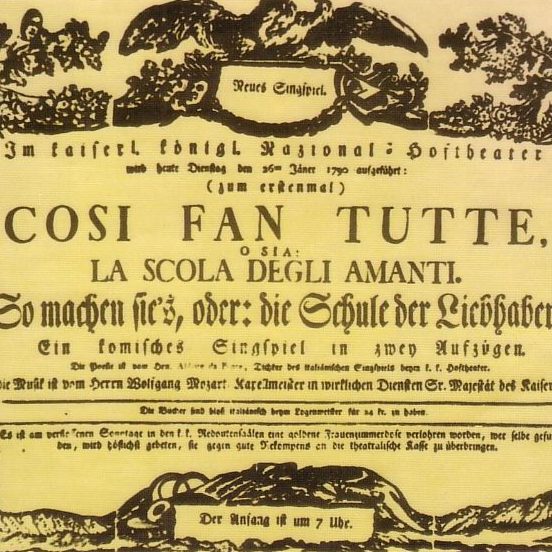It’s not often that an opera reviewer feels obliged to give a spoiler alert. After all, everybody knows who dies and who lives happily ever after, whether it’s Carmen, Mimi, or Figaro. So, let’s just say that if you’re even remotely considering attending the Dallas Opera’s current production of Mozart’s Così fan tutte, playing at the Winspear Opera House through February 28, by all means do so. And, as you fork over for the tickets, rest assured that you’ll likely get your money’s worth.
At Friday night’s opening, a brilliant cast of principals including mezzo-soprano Jennifer Holloway, tenor Brian Anderson, and baritone Michael Todd Simpson gave a consistently well-sung, engagingly acted performance, with particularly fine showings by soprano Nuccia Focile as the comically conspiratorial maid Despina and bass-baritone Thomas Allen as a coolly diabolical Don Alfonso. And the performance by South African soprano Eliza van den Heever, making her Dallas debut with this production in the role of Fiordiligi, is very nearly worth the price of admission in itself: she’s a captivating stage presence with a gorgeous, beautifully trained voice and wonderful musical instincts. Dallas Opera music director Graeme Jenkins, conducting from the harpsichord, underlined those often overlooked pungent Mozartian orchestral colors and, as always, maintained unfailing momentum—albeit with a few disturbing moments when communication between the stage and the pit faltered.
On the whole, however, the subtleties of Mozart were quite at home in the new opera house. A remarkably flexible, beautifully timed presentation of the recitatives provided another of several memorable aspects of this production, and conductor Jenkins found, throughout the score, numerous subtle hints—all too often passed over by conductors—of the opera’s germinal melodic motif.
And now, the spoiler. In a concept designed and conceived for San Francisco Opera in 2004, director John Cox and designer Robert Perdziola moved the setting of this eighteenth-century comedy of the war of the sexes to Monte Carlo in the summer of 1914. That’s right—the year in which Europe slid into the bloody cycle of violence that continued, depending on your take on history, until 1918, 1945, or 1990. The attentive audience member will likely start formulating the tragic implications early on, even while enjoying the rapid-paced comedy.
And, though purists will complain, but the point is worth pondering: the Europe in which Così premiered in 1790 was likewise hurtling headlong into decades of violence and upheaval. The subtle anxiety the attentive audience member may feel when seeing visual signals of encroaching World War in this production are miniscule compared to the silent fear a Viennese aristocrat, in wake of the latest news from France, would have been experiencing in 1790 while attending a performance of Così.
The twenty-first century opera goer is apt to mentally sidestep, when attending a traditional production of Così, the inherent misogyny—and to focus, with good reason, on Così as a brilliant musical depiction of character, irony, and the follies that make us human. But director Cox deals with the misogyny—and the plethora of related issues in Così—head on. In this production, when Thomas Allen as Don Alfonso sings the title line “Cosi fan tutte” (“All women are like that,” i.e., women are incapable of being faithful), he sweeps an accusing finger across the audience. In the end (sorry, this is the biggest spoiler of all), a ghost-like army of soldiers in World War I uniforms invades the stage, and Fiordiligi is left alone and desolate. In about ten seconds, Mozart’s scintillating comedy transforms into a tragedy, in a world in which women are routinely abandoned and war and violence can overwhelm beauty in less than a minute.
In short, Cox’s concept is much more than just a gimmick, and hopefully signals a continuation of Dallas Opera’s ongoing willingness to integrate tradition with innovation.
Photo: Jennifer Holloway as Dorabella succumbs to the charms of Michael Todd Simpson’s Guglielmo (Photo: Karen Almond, the Dallas Opera)





